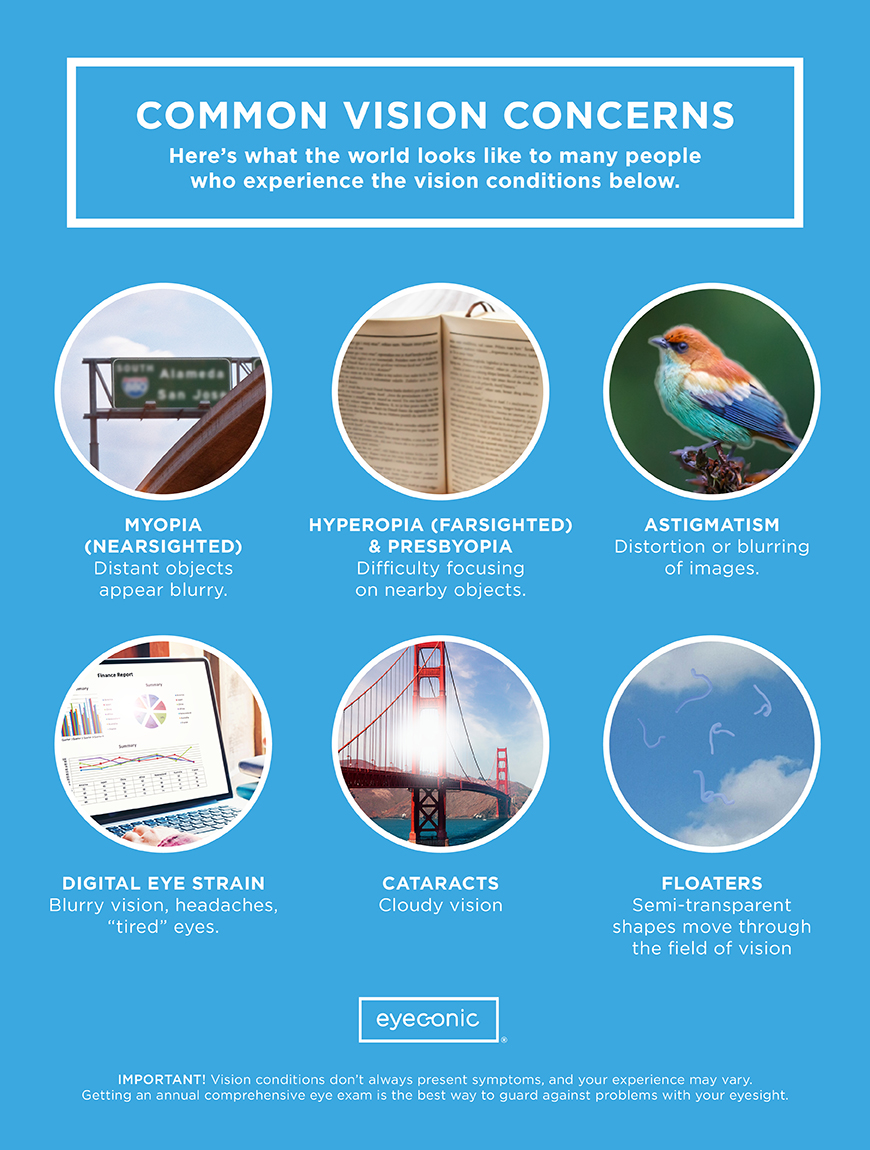The Complete Guide to Healthy Eyes
Optometrists, Ophthalmologists & Eye Exams – Oh My!
We rely upon our eyes every single day, so it’s not surprising that we tend to take them for granted. The health of our eyes has huge implications for our overall well-being—it can affect our ability to work or live independently.
Unfortunately, many people neglect regular checkups until symptoms become impossible to ignore. Even those of us who get a new prescription every year or two may not know the difference between a vision screening and comprehensive eye exam.
We’ve put together this helpful guide to provide you with information on keeping your eyes healthy and your vision sharp.
What’s the Difference Between Optometrists & Ophthalmologists?
Both optometrists and ophthalmologists focus on the health of your eyes. Optometrists are eyecare specialists who are often the first line of defense against blurry vision or eye diseases. Your optometrist will have attended college and at least 4 years of training, culminating in a doctor of optometry degree, or OD. Optometrists can perform vision screenings and eye exams (more about those below), prescribe glasses and contacts, and diagnose some eye diseases. They may also be able to prescribe medicine to deal with certain conditions. That being said, optometrists are not medical doctors.
Ophthalmologists are MDs, and they offer more comprehensive vision care services, including the treatment of serious eye diseases. In addition to providing a diagnosis, ophthalmologists can perform surgery and write prescriptions for a range of medications. Since ophthalmologists are medical doctors, they often work in hospitals.
It’s worth pointing out that regular vision exams can tip you off to health concerns that affect more than your eyesight, including diabetes and heart disease.
Whether you see an optometrist or ophthalmologist, regular checkups are necessary to protect your eyes. Online vision screenings cannot replace a visit to the doctor. Many people rely on an optometrist for essential eye care. Should you need treatment for a serious eye disease, you’ll probably be referred to an ophthalmologist.

Common Vision Concerns by Age
Kids: Myopia, Hyperopia, Amblyopia & More
Teens: Digital Eye Strain, UV Damage & Astigmatism
Adults: Presbyopia, Glaucoma & Cataracts
Any Age: Eye Floaters, Dry Eyes & Photophobia
Vision Screenings vs. Comprehensive Vision Exams
There are two aspects to vision care: making sure you can see clearly, and treating diseases that affect the eyes.
Vision screenings help evaluate the quality of your eyesight. They might also detect irregularities worth further investigation. You may remember the school nurse asking you to read a chart—that was a vision screening. While valuable, vision screenings can be performed by almost anyone, so they’re no substitute for a visit to an eyecare specialist.
As the name suggests, a comprehensive vision exam takes a more in-depth look at your eyes. Your optometrist or ophthalmologist will evaluate the clarity of your vision, but will also review the physical condition of the eyes. They might photograph the retina or dilate your pupils to evaluate your eyes in detail.
Such methods, along with the insights of an experienced professional, provide a much more thorough diagnosis. This is very important, as you want to identify conditions like glaucoma as early as possible.
Many eye doctors recommend an annual eye exam. Your needs may vary, so it’s important to discuss this with your OD or ophthalmologist.
Tips to Help Protect Your Eyes
Ironically, it’s often difficult to “see” the early signs of trouble with our eyesight. There are simple steps anyone can take that may help them avoid or delay eye damage and diseases. Some are common sense, while others are less obvious.
Here are four tips to help care for your eyes:
- Don’t smoke. Smoking increases your chances for developing serious eye diseases, including macular degeneration and uveitis. The good news, according to the American Academy of Ophthalmology, is that giving up smoking can quickly wipe away most of the elevated risk for certain eye diseases.
- Wear sunglasses. Ultraviolet rays can damage the sensitive cells in our retinas. The easiest way to protect yourself is by wearing sunglasses anytime you’re outdoors for an extended period of time. Make sure that your sunglasses block 100% of UV rays—just because they’re tinted doesn’t mean you’re protected.
- Use protective eyewear when playing sports. Traumatic eye injuries can usually be prevented by wearing appropriate protection, including goggles and ballistic eyewear.
- Check-in with your eye doctor. We’ve already mentioned that it’s important to get your eyes checked every year. Your eye doctor can spot issues before they become obvious to you, and when treatment may be easier and more effective. They’re also great sources of information should you have any questions about your vision.